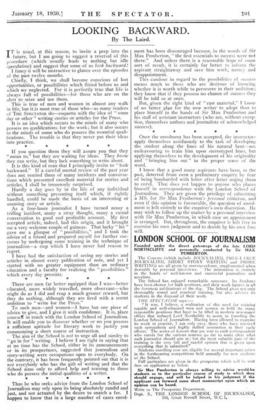LOOKING BACKWARD.
By The Laird.
IT is usual, at this season, to invite a peep into the futuie, but I am going to suggest a reversal of this procedure (which usually leads to nothing but idle speculation) and suggest that some of us look backward! I fancy it will be instructive to glance over the episodes of the past twelve months. Chiefly, I think, we shall become conscious of lost opportunities, or possibilities which flitted before us and which we neglected. For it is perfectly true that life is always full of possibilities—for those who are on the alert to seize and use them.
This is true of men and women in almost any walk in life, but it is most true of those who—as many readers of THE SPECTATOR do—coquette with the idea of " some day or other " writing stories or articles for the Press. It is an idea which occurs to the minds of many who possess no qualifiCations for the work; but it also occurs to the minds of some who do possess the essential quali- fications. The trouble is that they never put their ideas into practice.
If you question them they will assure you that they " mean to," but they are waiting for ideas. They know they can write, but they lack something to write about. It is this kind of man that I principally invite to " look backward." If a careful mental review of the past year does not remind them of many incidents and conversa- tions which presented excellent material for stories and articles, I shall be immensely surprised.
Hardly a day goes by in the life of any individual without something presenting itself which, if rightly handled, could be made the basis of an interesting or amusing story or article. As a free-lance journalist I have turned many a trifling incident, many a stray thought, many a casual conversation to good and profitable account. My first accepted article, indeed, had this origin, and it brought me a very welcome couple of guineas. That lucky " hit " gave me a glimpse of " possibilities," and I took the advice of a friend and prepared myself for further suc- cesses by undergoing some training in the technique of journalism—a step which I have never had reason to regret. I have had the satisfaction of seeing my stories and articles in almost every publication of note, and yet I started with no greater equipment than an ordinary education and a faculty for realising the " possibilities which every day presents.
There are men far better equipped than I was—better educated, more widely travelled, more observant—who might do as I did and reap a much greater reward, but they do nothing, although they are fired with a secret ambition to " write for the Press."
To such men—and women—I have but one piece of advice to give, and I give it with confidence. It is, place yourself in touch with the London School of Journalism. It will enable you to discover whether or no you possess a sufficient aptitude for literary work to justify you commencing a short course of instruction. The aim of the School is not to urge all and sundry to " go in for " writing. I believe I am right in saying that at no time has the School, either in its announcements or in its prospectuses, suggested that journalism and story-writing were occupations open to everybody. On the contrary, it has been frequently pointed out that it is not everybody who has the gift of writing and that the School aims only to afford help and •training to those who do possess the initial qualities of a writer. * * Thus he who seeks advice from the London School of Journalism may rely upon its being absolutely candid and just, and not actuated by the desire to snatch a fee. I happen to know that in a large number of cases enrol- ment has been discouraged because, in the words of Sir Max Pemberton, " the first essentials to success were not 'there." And unless there is a reasonable hope of some sort of result, it is certainly far better to inform the aspirant straightaway and save him work, money and disappointment.
This candour in regard to the possibilities of success means much to those who are desirous of knowing whether it is worth while to persevere in their ambition; they know that if they possess no chance of success they will be told so at once.
But, given the right kind of " raw material," I know of no better .plan for the new writer to adopt than to place himself in the hands of Sir Max Pemberton and his staff of assistant instructors (who are, without excep- tion, themselves authors and journalists of acknowledged success). * * Once the enrolment has been accepted, the instructors apply themselves assiduously to the task of developing the student along the lines of his natural bent—not endeavouring to train him upon stereotyped lines, but applying themselves to the development of his originality and " bringing him out " in the proper sense of the word.
I know that a good many aspirants have been, in the past, deterred from even a preliminary enquiry by fear of being bombarded with letter after letter urging them to enrol. That does not happen to anyone who places himself in correspondence with the London School of Journalism. They are given the privilege of submitting a MS. for Sir Max Pemberton's personal criticism, and even if this opinion is favourable, the question of enrol- ment is left entirely to the enquirer's own discretion. He may wish to follow up the matter by a. personal interview with Sir Max Pemberton, in which case an appointment is arranged. But, throughout, the enquirer is left free to exercise his own judgment and to decide by his own free will.






































 Previous page
Previous page